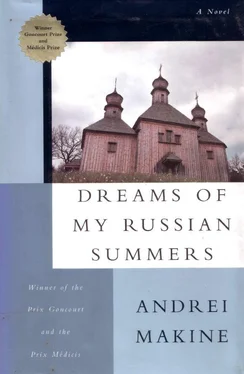"He'll be court-martialed…"
"What about it? He deserves it, doesn't he? While the others are dying in the trenches… He… He's a deserter!"
There was a moment of silence. The doctor sat down and began to massage his face with palms spotted with tincture of iodine.
"What if we put a plaster cast on him?" said Charlotte.
Behind his hands the doctor's face broke into an angry grimace. He half opened his mouth, then changed his mind. His reddened eyes lit up; he smiled.
"You and your plaster casts. We smash it off one man because it's scratching him. We put it on another because he's scratching himself. You continue to astonish me, Sharlota Norbertovna!"
During his rounds, he examined the wound and in a very natural tone said to the nurses, "We shall have to put a plaster on it. Just one layer. Sharlota will do it before she leaves."
Hope returned when, a year and a half after the first notification of death, she received another. Fyodor could not have been killed twice, she thought, so perhaps he was alive. This double death became a promise of life. Without saying anything to anyone, Charlotte prepared to wait.
He came back, arriving not from the west at the start of the summer, like most of the soldiers, but from the Far East, in September, after the defeat of Japan…
From being a town close to the front line, Saranza was transformed into a peaceful place, reverting to its sleep of the steppes beyond the Volga. Charlotte lived there alone: her son (my uncle Sergei) had entered a military academy; her daughter (my mother) had left for the nearest city, like all the students who wanted to continue their studies.
On a balmy September evening she left the house and walked into the empty street. She wanted to pick some stalks of wild dill at the edge of the steppe for her salted preserves before nightfall. It was on the way back that she saw him. She was carrying a bunch of the tall plants surmounted with yellow umbels. Her dress and her body were permeated with the clarity of the silent fields, with the fluid light of the sunset. The strong scent of the dill and the dry plants clung to her fingers. By now she knew that this life, despite all its pain, could be lived, that one must travel through it slowly; passing from the sunset to the penetrating odor of the stalks; from the infinite calm of the plain to the singing of a bird lost in the sky; yes, going from the sky to that deep reflection of it that she felt within her own breast, as an alert and living presence. And one must even pay heed to the warmth of the dust on this little path leading toward Saranza…
She raised her eyes and saw him. He was walking toward her, still a long way off, far up the road. If Charlotte had welcomed him on the threshold of the room, if he had opened the door and stepped inside, as she had imagined it for so long, as all the soldiers did when they came back from the war, in life or in films, then she would doubtless have uttered a cry, would have hurled herself at him, clinging to his shoulder belt, would have wept…
But he appeared very far away, making himself known little by little, giving his wife the time to come to terms with the road now rendered unrecognizable by the silhouette of a man whose uncertain smile she could already make out. They did not run, they exchanged no words, they did not kiss. It seemed as if they had been walking toward each another for an eternity. The road was empty; the evening light, reflected by the golden foliage of the trees, was of an unreal transparency Stopping near him, she gently waved her bouquet. He nodded his head, as if to say, "Yes, yes, I understand." He was not wearing a shoulder belt, just one at his waist, with a buckle of tarnished bronze. His boots were red with dust.
Charlotte lived on the ground floor of an old wooden house. From year to year, for a century, the ground had been rising imperceptibly and the house subsiding, so much so that the window of her room scarcely came above the level of the pavement… They entered in silence. Fyodor put down his pack on a stool, made to speak, but said nothing, only cleared his throat, bringing his fingers to his lips. Charlotte began to prepare a meal.
She surprised herself by replying to his questions without thinking (they talked about bread, about ration cards, about life in Saranza); by offering him tea, by smiling when he said, "All the knives in this house need sharpening." But as she took part in this first, still hesitant conversation she was elsewhere. In a profound absence where quite different words were being uttered: "This man with short hair that looks as if it were sprinkled with chalk is my husband. I have not seen him for four years. They buried him twice – first in the battle of Moscow, then in the Ukraine. He is here, he has come back. I ought to weep for joy. I ought to… His hair is quite gray…" She guessed that he, too, was far away from their conversation about ration cards. He had come home when the lights of victory had long since gone out. Life was resuming its daily round. He was coming back too late. Like an absentminded man who, invited to lunch, arrives at dinnertime and surprises the mistress of the house as she is saying her farewells to the last of the lingering guests. "I must look very old to him," Charlotte thought suddenly. But not even this idea could disrupt the strange lack of emotion in her heart, this indifference that left her puzzled.
She wept only when she saw his body. After the meal she heated water and brought out a zinc basin, the little child's bath, which she placed in the middle of the room. Fyodor crouched in this gray vessel, whose bottom yielded underfoot, emitting a vibrant sound. And as she poured a trickle of warm water onto the body of her husband, who clumsily rubbed his shoulders and his back, Charlotte began to weep. The tears coursed down her face, whose features remained immobile, and they fell, mixing with the soapy water in the basin.
This body was that of a man she did not know. A body riddled with scars, with gashes – some of them deep, with fleshy edges, like huge voracious lips, some with a smooth shiny surface, like a snail's trail. In one of the shoulder blades a cavity had been dug: Charlotte knew what type of little jagged shell splinters did that. The pink traces of the stitches of a suture surrounded one shoulder, losing themselves in his chest…
Through her tears she viewed the room as if for the first time: a window at ground level; the bunch of dill, already a relic from another epoch in her life; a soldier's pack on the stool near the hall; great boots covered with red dust. And beneath a bare and dim bulb, in the midst of this room half sunk in the ground – this unrecognizable body, as if torn by the wheels of a machine. Stunned words formed unconsciously within her: "this is me, Charlotte Lemonnier, here in this izba buried beneath the grass of the steppes, with this man, this soldier, whose body is lacerated with wounds, the father of my children, the man I love so much… this is me, Charlotte Lemonnier…"
Across one of Fyodor's eyebrows there was a broad white gash, which, as it grew narrower, made a line across his forehead. It gave him a permanently surprised expression. As if he simply could not manage to get used to this postwar life.
He lived for less than a year… In winter they moved into the apartment where, as children, we were to come and stay with Charlotte every summer. They did not even have time to buy new crockery and cutlery. Fyodor cut the bread with the knife he had brought back from the front, fashioned from a bayonet…
As I listened to the adults' stories, this was how I pictured our grandfather during that incredibly brief reunion: a soldier climbs the steps to the izba . His gaze is lost in his wife's, and he has just time to say, "You see, I have come back…," before collapsing and dying of his wounds.
Читать дальше












